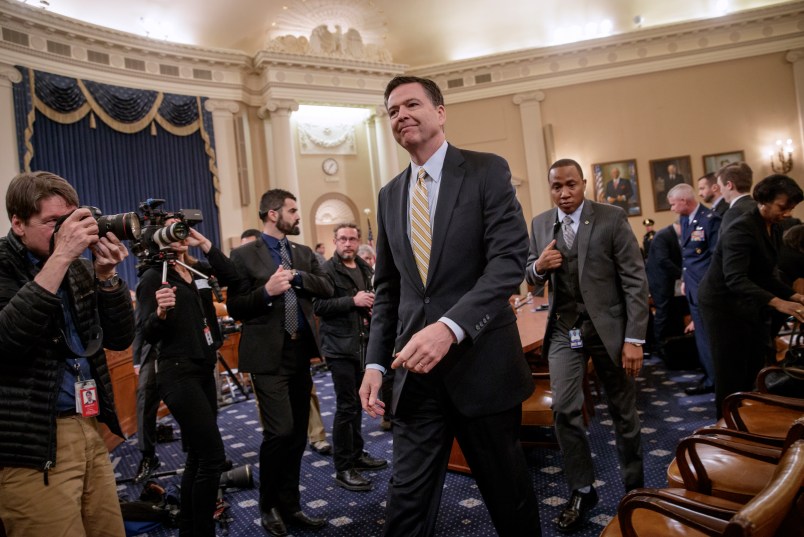Let me add a few more thoughts on the events of the evening.
There is a glorious swirl of irony, disingenuousness and bad faith in the vortex of opinions about James Comey and the notional rationale for firing him. Speaking just for myself, after Comey’s October 28th letter to Congress, I thought and think that by all rights he should have resigned. I think I wrote shortly after Trump’s election that by rights Comey should be fired but that it would be a national calamity if he was. An independent FBI Director was critical to the security of the nation as soon as a countdown started for Trump to become President of the United States.
Deputy Attorney General Rod Rosenstein wrote the memo articulating the argument for why James Comey should be fired. I was just speaking to one of my colleagues who said that in isolation, Rosenstein’s memo was not totally off base. Comey has made a number of big mistakes as FBI Director. (You can see the memo at the bottom of this article.) But that is really beside the point. As an argument in the abstract to justify why Comey could be fired, it’s an interesting argument. As an explanation of why Comey was in fact fired it is flatly ridiculous.
We heard earlier from CNN’s Jeff Zeleny that President Trump decided he wanted to fire Comey a week ago and then tasked Jeff Sessions with coming up with a rationale. But we don’t need Zeleny to tell us that. It’s obvious that this a rationale and not an explanation.
The idea that Trump fired Comey because he was unfair to Hillary Clinton or set aside DOJ guidelines in a way that was damaging to her is clearly not true. Indeed, it is so transparently nonsensical that putting it forward as a rationale suggests a certain presidential indifference to what anyone thinks.
As an accomplished lawyer, Rosenstein may have been able to justify the memo as an argument within the four corners of the document. But he knew that he was preparing an argument for firing the FBI Director while the FBI is investigating the President and his top associates for colluding with a foreign power to subvert a US election. The theory isn’t the point. The nature of the act is. This is a massive abuse of office. It is a very plausible basis for impeachment, though its plausibility in that regard is irrelevant unless and until there is political will in the Congress to take that step. Impeachment is a political not a legal process.
Why Rosenstein was party to this is impossible for me to answer at this point. He is said to be widely respected. But the deed itself tells the story.
Here’s the key issue.
Months ago Jeff Sessions recused himself from any involvement in the Russia probe. That recusal put the investigation in the hands of Deputy Attorney General Rod Rosenstein.
Whatever his reputation to this point, Rosenstein has zero credibility to run this investigation. The taint of corruption and disgrace on him permanent and irreversible.
Here’s the fundamental issue facing the country right now.
In criminal trials there are certain actions defendants can take from which judges will tell juries they can infer guilt. In a political context, this is one of those moments. We are now hearing word from White House officials that the White House is stunned at the backlash at Comey’s firing. Didn’t Democrats think he was doing a bad job? We’re even hearing commentators speculate that maybe this may have been a huge miscalculation. The White House didn’t realize how big a deal this was. In the final analysis I think this will be judged a major miscalculation – just not in the sense they mean. Frankly, no one is that naive. It doesn’t wash.
There is only one reasonable conclusion that can be drawn from the decision to fire Comey: that there is grave wrongdoing at the center of the Russia scandal and that it implicates the President. As I write this, I have a difficult time believing that last sentence myself. But sometimes you have to step back from your assumptions and simply look at what the available evidence is telling you. It’s speaking clearly: the only reasonable explanation is that the President has something immense to hide and needs someone in charge of the FBI who he believes is loyal. Like Jeff Sessions. Like Rod Rosenstein.
This is a very dark and perilous moment.






